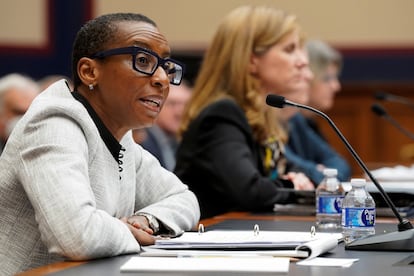Antisemitism opens new front in Republicans’ culture war against Democrats
The presidents of three major universities were grilled by a House committee on what they are doing to address incidents against Jewish and Israeli students on campuses


The Republicans have found a new battering ram to attack the Democrats: antisemitism. On Tuesday, the Education Committee of the Republican-controlled House held a hearing with the heads of Harvard University, the University of Pennsylvania, and MIT to discuss the cases of antisemitism recorded on university campuses in the wake of Israel’s offensive against Gaza. The hearing opened with videos of pro-Palestinian protests on campus, with students chanting slogans such as “intifada, intifada, long live the intifada.”
The hearing was aimed at learning how universities were responding to these cases, and what measures they were adopting to prevent harassment and threats, and to ensure a safe environment for Jewish and Israeli students — incidents against Arab or Muslim students were only mentioned in passing. But the Republicans turned the hearing into an inquisition, asking the rectors questions about whether they believed in Israel’s right to existence and how many conservative professors were part of the faculty.
The hearing was also attended by Pamela Nadell, professor of history and Jewish studies at American University, who traced the rise of antisemitism in the United States to the Donald Trump administration. She argued that the Republican’s ambivalent response to the racist rally in Charlottesville in 2017, when protesters chanted “Jews will not replace us,” was “a turning point” that sparked a rise in antisemitism.
Nadell also praised the White House’s national strategy against antisemitism, which was adopted in May, and called for a similar plan to tackle Islamophobia. Several Republicans in the committee opposed the equation of antisemitism and Islamophobia.
The House hearing comes as Israel’s offensive against Hamas in Gaza continues to fuel tensions in the United States, even leading to physical attacks, such as the shooting of three students of Palestinian origin from Brown University over Thanksgiving. For the Republicans, the tension has served to open a new front of their culture war against the Democrats.
At Tuesday’s hearing, the Republicans took special aim at Claudine Gay, the president of Harvard University, where around 30 student groups published a letter blaming the Hamas attack on Israel. Gay hesitated at first to condemn the message, prompting accusations that the university was neglecting its Jewish students. The university was also in the spotlight as it is under investigation for an alleged case of discrimination. Gay did not wish to comment on the case as it is an open investigation.
But while Gay may have been the main target, the Republicans accused all three university heads of not doing enough to stop antisemitism. “Institutional antisemitism and hate are among the poisoned fruits of your institutions’ cultures,” House Education and Workforce Chair Virginia Foxx told the presidents.
“Do you have the courage to truly confront and condemn the ideology driving antisemitism, or will you offer weak blame-shifting excuses, and yet another responsibility-dodging task force? That’s ultimately the most important question for you to confront in this hearing,” Foxx said.
“The free exchange of ideas is the foundation upon which Harvard is built,” said Gay. “Antisemitism is a symptom of ignorance. And the cure for ignorance is knowledge. Harvard must model what it means to preserve free expression while combating prejudice and preserving the security of our community,” she added.
Republican Michelle Steel asked the university presidents about “unreported money from Middle Eastern donors,” but the three denied the allegations.
The three university presidents condemned the Hamas attack and the cases of antisemitism recorded on campus. They also outlined a series of measures to address the issue, such as greater education and strengthening mental health care services. But the hearing is another setback for the universities, with donors withdrawing funding from Harvard and Pennsylvania over what they consider the college’s insufficient efforts to tackle antisemitism.
Antisemitism, however, was already on the rise before the war in Gaza. According to the FBI, antisemitic hate crimes increased 25% from 2021 to 2022. American Jews make up 2.4% of the population, but are victims of 63% of religiously motivated hate crimes, according to the FBI. Tuesday’s hearing has only led to more criticism, while Republicans continue their efforts to cut funding to the Office of Civil Rights, which deals with cases of discrimination such as antisemitism.
Sign up for our weekly newsletter to get more English-language news coverage from EL PAÍS USA Edition
Tu suscripción se está usando en otro dispositivo
¿Quieres añadir otro usuario a tu suscripción?
Si continúas leyendo en este dispositivo, no se podrá leer en el otro.
FlechaTu suscripción se está usando en otro dispositivo y solo puedes acceder a EL PAÍS desde un dispositivo a la vez.
Si quieres compartir tu cuenta, cambia tu suscripción a la modalidad Premium, así podrás añadir otro usuario. Cada uno accederá con su propia cuenta de email, lo que os permitirá personalizar vuestra experiencia en EL PAÍS.
¿Tienes una suscripción de empresa? Accede aquí para contratar más cuentas.
En el caso de no saber quién está usando tu cuenta, te recomendamos cambiar tu contraseña aquí.
Si decides continuar compartiendo tu cuenta, este mensaje se mostrará en tu dispositivo y en el de la otra persona que está usando tu cuenta de forma indefinida, afectando a tu experiencia de lectura. Puedes consultar aquí los términos y condiciones de la suscripción digital.








































